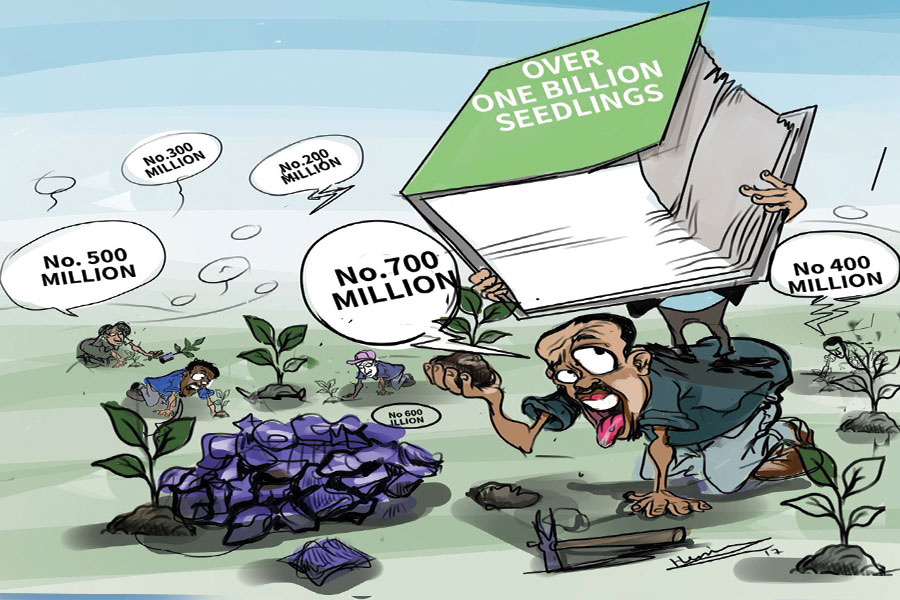
Fortune News | May 17,2025
Jan 3 , 2021
By Clay Webster
Instead of putting in place a complicated initiative by a government or industry association to recycle a greater percentage of the water bottles that are discarded, simply increasing the refund fee for returning collected bottles would do the trick, writes Clay Webster (complaintsandrecriminations@gmail.com), who studied energy and environmental policy at Johns Hopkins School of Advanced International Studies and has written about energy, commodity and financial markets for The Motley Fool, Plattsand US News & World Report.
One of the seemingly unsolvable byproducts of Ethiopia’s surging domestic investment in new water bottling companies is the plethora of discarded plastic bottles that litter roadsides and clog water drainage systems throughout urban areas. Many of these bottles travel out of urban places via waterways and pollute ecosystems further off in rural ones.
This is not an unknown issue. Governmental bodies have sounded the alarm and even put forth new initiatives to fight the scourge. A new group of private bottlers has even formed an association to raise funding for extensive recycling efforts.
But all this harping on solutions to the plastic bottle problem appears to have ignored the most obvious panacea – raising the refund fee for returned bottles.
As current policy stands, informal collectors – normally those unemployed by the formal sector – can stand to make a negligible fee for each kilogram of bottles they turn in to recycling centres. This policy allows for a certain amount of cleanup to happen naturally.
But as any observer can note on their own, there remains a surplus of uncollected bottles that make their way into rural areas far from recycling companies. These bottles either remain in the environment and leach chemical residue into the soil and waterways for centuries or make their way into landfills.
On the commercial side of things, recycling plastic bottles domestically also saves foreign currency that would otherwise be required to import the necessary petrochemicals.
Rather than concocting some government or industry initiative to recycle a slightly greater percentage of the total bottles, simply increasing the refund fee for returning collected bottles would do the trick all by itself. By adding a one or two Birr surtax to the retail price that would then go to pay for each bottle returned, a circular economy would be created wherein collecting bottles for a living would pay off handsomely.
A greater number of collectors would join the informal economy, driving down the number of discarded bottles, and the increased refund fee would compensate longer transport distances for returning the bottles to recycling facilities from rural communities. Additionally, an increased refund fee would flow to the income of informal collectors, most of whom make up the ranks of the unemployed poor. In this sense, the policy would double as an anti-poverty programme without costing the government budget any additional funds.
Of course, the water bottlers would likely lobby against such a tax, which would raise retail prices by 10 to 15pc. But the theory behind this type of tax system is nothing new.
British economist Arthur Pigou came up with his namesake Pigouvian tax a century ago. The reasoning behind them is that since commercial activities have always produced external costs on those other than the purchaser of certain goods, those costs must be added back in through tax policy to be paid by the buyer of the good.
In the present situation, the buyer of bottled water may discard the bottle in the environment once she is finished drinking it. The bottle costs present and future generations in terms of its ongoing pollution even though they did not benefit from drinking it. By placing the cost of pollution on the front-end user, Pigouvian taxes forces users to pre-pay for the future costs of their purchase.
Nations with this type of deposit refund scheme recycled between 80pc and 95pc of their plastic bottles, much higher than those without it, according to research by the UK Parliament’s Environmental Audit Committee in 2017.
But the refund amount is just as important. By increasing the recycled portion of the more than one billion plastic bottles that are produced here every year, Ethiopia will benefit from less plastic pollution, increase the incomes of the poor, and save scarce foreign currency for greater needs.
PUBLISHED ON
Jan 03,2021 [ VOL
21 , NO
1079]


Fortune News | May 17,2025

Editorial | Nov 04,2023

My Opinion | Jul 22,2023

Viewpoints | Dec 05,2018

Radar | May 11,2019

Viewpoints | Jun 03,2023

Verbatim | Jul 13,2020

My Opinion | Feb 19,2022

Fortune News | Dec 30,2023

Viewpoints | Nov 18,2023

Photo Gallery | 141123 Views | May 06,2019

My Opinion | 134141 Views | Aug 14,2021

Photo Gallery | 131378 Views | Apr 26,2019

My Opinion | 130704 Views | Aug 21,2021

Dec 22 , 2024 . By TIZITA SHEWAFERAW
Charged with transforming colossal state-owned enterprises into modern and competitiv...

Aug 18 , 2024 . By AKSAH ITALO
Although predictable Yonas Zerihun's job in the ride-hailing service is not immune to...

Jul 28 , 2024 . By TIZITA SHEWAFERAW
Unhabitual, perhaps too many, Samuel Gebreyohannes, 38, used to occasionally enjoy a couple of beers at breakfast. However, he recently swit...

Jul 13 , 2024 . By AKSAH ITALO
Investors who rely on tractors, trucks, and field vehicles for commuting, transporting commodities, and f...

Aug 23 , 2025
Banks have a new obsession. After decades chasing deposits and, more recently, digita...

Aug 16 , 2025
A decade ago, a case in the United States (US) jolted Wall Street. An ambulance opera...

Aug 9 , 2025
In the 14th Century, the Egyptian scholar Ibn Khaldun drew a neat curve in the sand....

Aug 2 , 2025
At daybreak on Thursday last week, July 31, 2025, hundreds of thousands of Ethiop...
Aug 23 , 2025 . By BEZAWIT HULUAGER
The fuel industry is facing its biggest shakeup in decades as federal regulators roll...

Aug 23 , 2025 . By BEZAWIT HULUAGER
Two domestic companies, IE Networks and Liyana Healthcare, have emerged as the first...

Aug 23 , 2025 . By NAHOM AYELE
A new directive authorises state-run hospitals and clinics to outsource not only non...

Aug 29 , 2025 . By BEZAWIT HULUAGER
The federal government has turned its attention to an unlikely export sector: healthc...